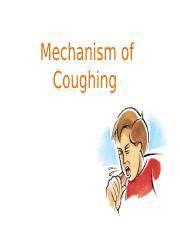咳嗽机制

理解咳嗽反射
咳嗽是一种重要的反射机制,用于保护我们的呼吸道。当喉咙或肺部检测到刺激物时,特殊的受体会向大脑发送信号以引发咳嗽。这种快速的空气排出有助于清除刺激物,确保我们的呼吸道保持畅通。忽视持续的咳嗽可能表明潜在的健康问题,需要立即关注。因此,了解这种反射背后的原因至关重要。
咳嗽反射可以由多种因素触发,包括灰尘、烟雾、感染或过敏。慢性疾病,如哮喘或慢性阻塞性肺疾病(COPD),也可能导致频繁咳嗽。通过识别这些触发因素,个人可以采取积极措施以避免潜在的刺激物。持续几周或几个月的咳嗽不应被忽视。
咳嗽主要有两种类型:有痰的和无痰的。有痰咳嗽会咳出痰液,而无痰咳嗽则不会产生任何痰。两种类型都可以揭示一个人的健康状况的重要信息。例如,有痰咳嗽可能表明支气管炎或肺炎,需要进行医学评估。
在某些情况下,咳嗽可能导致额外的健康并发症。持续的咳嗽可能导致喉咙痛、肋骨骨折甚至肺炎,如果不加以治疗。因此,经历持久或严重咳嗽时,寻求医疗建议至关重要。理解咳嗽背后的机制可以使个人采取适当的行动。
何时寻求医疗帮助
确定何时因咳嗽寻求医疗帮助可能很具挑战性。指南建议,如果咳嗽持续超过三周,必须看医生。这个时长通常表明需要进一步调查潜在原因。其他警告信号包括咳血、高烧或呼吸困难。
此外,伴随咳嗽出现的原因不明的体重减轻或夜间盗汗的个人应咨询医疗专业人士。这些症状可能表明严重的疾病,如结核病或肺癌。全面的检查和诊断测试可以澄清情况。
自我诊断可能导致不必要的恐慌或症状误管理。依赖医疗提供者进行准确评估至关重要。他们可以根据咳嗽的根本原因提供适当的治疗。及时干预可以显著改善健康状况并缓解症状。
此外,理解症状的背景是有益的。例如,如果咳嗽在开始新药物或经历重大生活变化后出现,这些信息可以帮助您的医生进行诊断。全面沟通您的健康历史是获得个性化护理的基础。
咳嗽的类型及其意义
慢性咳嗽及其后果
慢性咳嗽定义为咳嗽持续超过八周,可能表明潜在的健康问题。它常常会干扰日常活动,并可能导致显著的不适感。
这种类型的咳嗽可能源自多种原因,如哮喘、慢性支气管炎或胃食管反流病(GERD)。识别根本原因对于制定适当的治疗方案至关重要。
长期的慢性咳嗽可能导致并发症,包括睡眠障碍、疲劳,甚至由于持续的不适而导致抑郁。
寻求医疗帮助对于慢性咳嗽至关重要,因为早期干预可以防止健康进一步恶化和后续更加复杂的治疗选项。
经历慢性咳嗽的患者应保持症状日记,记录触发因素、持续时间及其他伴随症状,这能帮助医疗提供者进行诊断。
急性咳嗽及其短期影响
急性咳嗽通常持续不超过三周,通常由像普通感冒或流感这样的病毒感染引起。虽然通常比慢性咳嗽令人担忧的程度低,但它仍可能显著影响一个人的生活质量。
急性咳嗽可能导致临时的问题,如喉咙痛、睡眠困难和普遍的易怒。在某些情况下,它还可能导致其他并发症,如鼻窦感染或支气管炎。
大多数急性咳嗽在没有医疗干预的情况下会自行缓解,但如果症状持续或恶化,咨询医疗专业人士以排除更严重的感染或疾病是至关重要的。
家庭疗法和非处方药物可以缓解急性咳嗽,但适当的水分补充和休息同样对恢复至关重要。
区分咳嗽的类型——急性与慢性——有助于更好地理解它们的意义及所需的治疗。
过敏性咳嗽:触发因素与管理
过敏性咳嗽通常是由花粉、尘螨或宠物皮屑等环境触发因素引起的。免疫系统的过敏反应导致呼吸道黏液产生增加和刺激。
过敏性咳嗽的症状可能包括持续的干咳、喉咙发痒和打喷嚏。这些症状可能与其他呼吸问题的症状重叠,因此识别病因至关重要。
管理方法包括避免已知过敏源、服用抗组胺药,以及在某些情况下接受过敏针或使用医疗提供者处方的吸入器。
遭受过敏性咳嗽的个人应维持清洁的生活环境,减少家庭中的刺激物和过敏源,以有效控制症状。
通过生活方式和环境变更来管理过敏的教育是减少过敏性咳嗽对日常生活影响的关键。
心理性咳嗽:理解其联系
心理性咳嗽,也称为习惯性咳嗽或抽搐咳嗽,源于心理压力而非身体疾病。它通常表现为一种持续和干扰性的咳嗽,且没有明显的医学原因。
这种类型的咳嗽在儿童中可能更为常见,但也可能影响成年人,常常因焦虑或压力情境而加剧。理解情感诱因对于应对这种状况至关重要。
治疗通常涉及行为疗法、压力管理技术,可能还需要与心理健康专业人士合作以识别潜在问题。
家人和朋友的支持在帮助个人应对心理性咳嗽方面发挥着关键作用,因为支持性环境可以降低压力和焦虑水平。
识别和确认心理性咳嗽的心理方面可以帮助减少污名,并鼓励寻求适当的治疗以获得缓解。
何时寻求医疗帮助
识别何时咳嗽成为令人担忧的问题至关重要。持续超过几周的咳嗽、伴有血痰或高烧则需要立即就医。
其他应促使咨询的症状包括呼吸急促、胸痛和无意的体重下降。这些可能表明更严重的健康问题。
医疗提供者可能会建议进行诊断测试,包括胸部X光或肺功能测试,以确定咳嗽的确切原因并指导治疗方案。
在某些人群中,如老年人或有慢性健康问题的人,即使是轻微的咳嗽也可能导致并发症,因此及时干预更加重要。
对于与咳嗽相关的症状采取积极主动的态度,并理解何时它们预示着更严重的健康问题,对于预防严重并发症和确保健康至关重要。
何时寻求医疗帮助
识别严重症状
咳嗽是一种常见的反射反应,有助于清理气道。然而,如果咳嗽持续或伴有严重症状,寻求医疗帮助至关重要。像呼吸困难、胸痛或咳血等症状绝不能被忽视。
此外,如果咳嗽持续超过三周,这可能表明存在更严重的潜在问题,例如哮喘、慢性支气管炎甚至肺癌。忽视这些危险信号可能导致严重的健康并发症。
早期诊断在管理与慢性或严重咳嗽相关的潜在健康风险方面至关重要。因此,密切关注症状的变化是很有必要的。
了解咳嗽的原因
咳嗽可能由多种因素引起,从简单的过敏到严重的感染。常见原因包括感冒、流感、过敏和环境中的刺激物。然而,持续性咳嗽可能表明潜在的状况,如胃食管反流病(GERD)或慢性阻塞性肺病(COPD)。
识别咳嗽的根本原因对确定合适的治疗方案至关重要。医疗专业人员通常会进行全面检查,可能包括胸部X光或肺功能测试,以确定原因。
了解各种原因使个人能够及早识别症状,并了解何时咨询医疗提供者,以避免并发症。
忽视咳嗽的潜在并发症
忽视持续咳嗽可能导致多种并发症,这些并发症可能显著影响生活质量。例如,未经治疗的呼吸道感染可能加重为肺炎或支气管炎,均需更广泛的治疗和恢复时间。
此外,慢性咳嗽会影响睡眠质量,导致疲劳、易怒和生产力低下。处理持续健康问题带来的压力也可能导致焦虑和抑郁,从而形成一个进一步复杂化康复的恶性循环。
了解潜在并发症强调了及时处理持续咳嗽的重要性。早期干预可以防止严重的健康问题,并促进更健康的生活方式。
预防措施和生活方式改变

理解咳嗽的原因
咳嗽可能是多种潜在疾病的症状,其中有些如不及时治疗可能会变得严重。忽视持续性咳嗽可能导致并发症,因此及早识别其原因至关重要。 常见原因包括呼吸道感染、过敏,甚至胃食管反流病(GERD)。每种情况都需要特定的干预措施,以防止进一步的健康问题。
区分急性咳嗽和慢性咳嗽也很重要。急性咳嗽通常在几周内缓解,而慢性咳嗽会持续更长时间,可能表明更严重的健康问题。识别咳嗽的持续时间和特征可以帮助获得及时的医疗服务。
环境因素,如污染和烟雾,也可能加重咳嗽。有慢性疾病如哮喘或慢性阻塞性肺疾病(COPD)的人特别容易受到影响。识别并减少接触这些诱因对长期呼吸健康至关重要。
定期进行健康检查可以帮助控制潜在的与咳嗽相关的健康问题。这种积极的做法可以及早发现和治疗可能导致咳嗽的潜在疾病。
预防措施和居家疗法
保持良好的卫生习惯是预防咳嗽相关感染的最简单方法之一。定期洗手,尤其是在流感季节,可以显著降低呼吸系统疾病的风险。此外,在没有肥皂和水的地方使用免洗手消毒液也很有帮助。
保持水分充足是另一个重要的预防措施。喝足够的液体有助于保持喉咙湿润,可以缓解导致咳嗽的刺激。蜂蜜柠檬草本茶特别舒缓,有助于缓解咳嗽。
加湿器在缓解咳嗽,尤其是在干燥季节也很有益。增加空气湿度可以减轻喉咙刺激,使呼吸更容易。然而,保持这些设备的清洁以防止霉菌和细菌滋生是至关重要的。
最后,避免刺激物如烟雾、强烈气味和过敏原也至关重要。个人应创造一个干净安全的家庭环境,以尽量减少咳嗽诱因的机会。实施这些生活方式改变在预防与咳嗽相关的严重健康问题方面能带来显著益处。